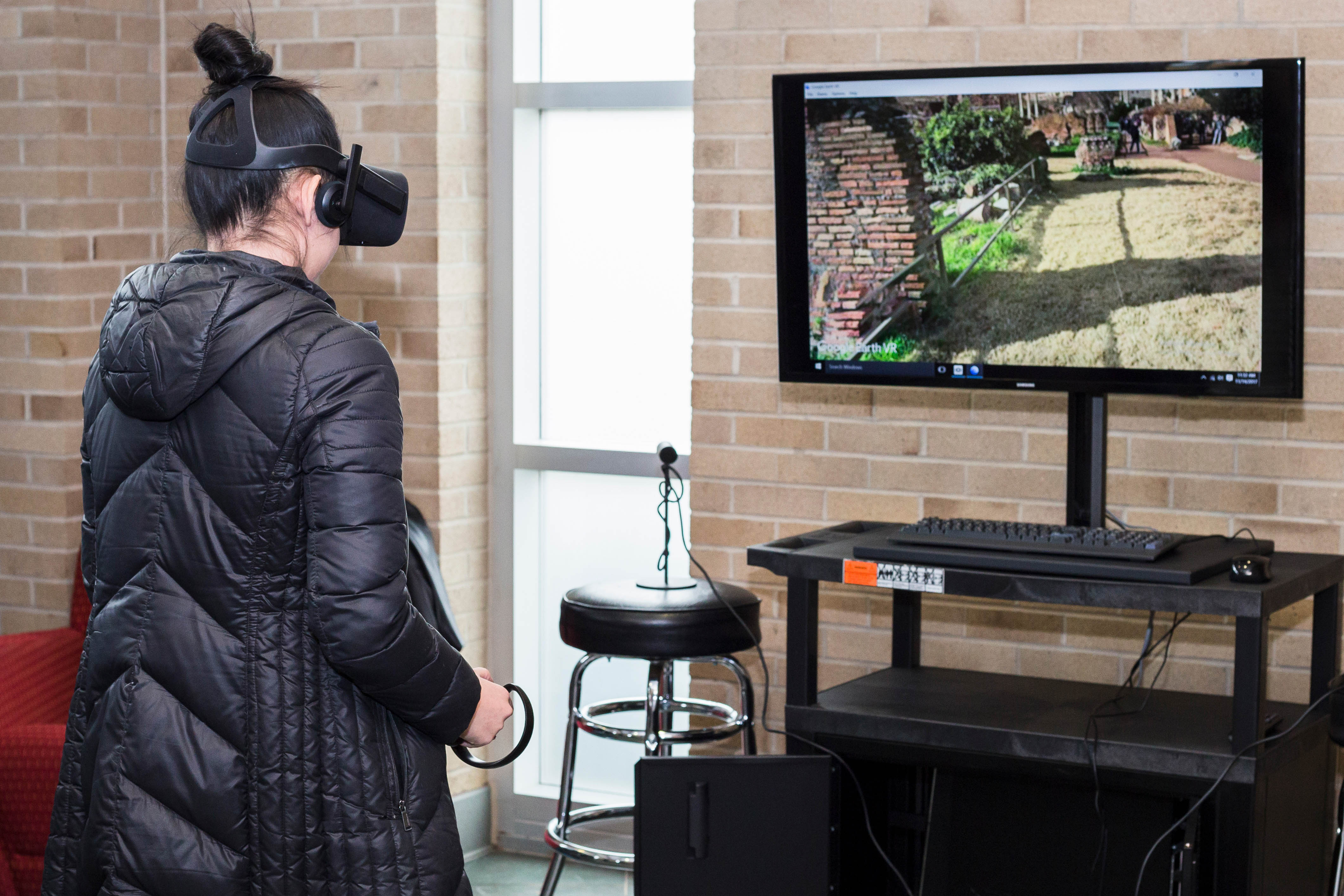As we enter 2018, it’s good to have a sense of what’s to come; what should we anticipate, and how will it affect our particular interests and communities? Assessing local and national trends in various industries and fields of study, experts from Maryville University share their observations of what we can expect this year—and beyond.

Accounting
In 2017, the rapid progress of the tax reform bill in government highlighted the need for accounting professionals to activate critical thinking skills to respond to environmental changes and relevant needs of their clients.These events provide a context for accounting students to enhance critical reading, analytical and problem-solving skills that connect accounting theory to practice in a rapidly evolving business world. Critical thinking skills enhance employability, career outcomes and professional development. Students will enhance critical thinking skills and learning experiences by conducting policy research and using class projects and simulations to actively engage in a real-world context.
Traci Hodges, PhD, CPA
Assistant Professor of Accounting
Campus Residential Life
In the past few years, lots of different technology has entered the homes of Americans including Apple TVs, smart TVs, Amazon devices, voice activation, streaming media services and remote access cameras and lighting systems, to name a few. As this becomes the norm for home life, it’s essential that campus residential services find ways to connect these amenities with student learning. Such technology and connectivity is quickly becoming less of a luxury and more of an expectation. For example, Maryville University provides Apple TVs in all residence hall common areas and offers a movie streaming service students can access anytime and anywhere on campus.
Ryan McDonnell
Director of Residential Life
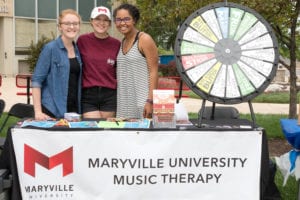 Campus Student Engagement
Campus Student Engagement
One of the strongest trends in student engagement both nationally and at Maryville University is personalization; the need to create a quality relationship to fit every student. Maryville’s Center for Student Engagement works hard to create varied opportunities for students to engage outside of the classroom, build relationships with faculty, staff and other students and equip themselves with skills and thought patterns for success. We’re doing that by employing over 75 “Involvement Geniuses” that meet with students to help match them to their interests, strengths and areas for improvement. Similarly, we’re unveiling ways to get involved through social media and technology that allow new populations of students to get involved without always being present on campus.
Allyson Crust
Assistant Director, Student Involvement
Education
I am extremely excited about the potential of virtual reality (VR) in education. The technology still needs to improve, but 2018 will be a jumping off point for VR in schools. Imagine soon being able to take a group of preschoolers on an immersive journey into an African jungle or having a group of high school students who are consider a major in premed try their hand at surgery. Most importantly, students should learn to create content in VR. Maryville University is already working with third graders to create virtual field trips for different St. Louis locations to share with distant partner schools. In the School of Education, we’re using VR in teacher preparation. Our students can checkout 360 degree cameras and record their practicum classrooms. Students can then watch with VR headsets, observing not only themselves teaching, but also what every child is doing.
Steve Coxon, PhD
Executive Director, Center for Access and Achievement
Associate Professor
Healthcare
The only certainty for healthcare this year is continued uncertainty. Given the revisions to the Affordable Care Act, the gains in the number of people with healthcare coverage may be diminished or eliminated. If the U.S. Congress is successful in passing legislation that results in an increase the cost of health care insurance, may more people will be uninsured. This will cause all of us with coverage to pay higher medical costs, as there isn’t enough charity care to cover the cost of the uninsured or underinsured. Although we have an outstanding healthcare system, only those that can will see benefits from the system.
Charles J. Gulas, PT, PhD
Dean, Walker College of Health Professions
Humanities
Recent trends indicate that students graduating with a humanities degree are increasingly competitive in a diverse economy. Studies show the market for job candidates skilled in writing and critical thinking is not only stable in fields most commonly connected to humanities—like English, education, communication and professional writing—but also growing in other careers such as marketing, public relations and digital production, especially as they relate to tech industries. Indeed, a 2016 survey by career advice website Zippia found even more evidence of the value of a humanities background in atypical fields like medicine, where English is the seventh most popular undergraduate major for doctors. Although perceptions of value in education may still reveal a bias toward STEM-based learning, a high level of proficiency in writing and critical thinking—skills that are central to the study of humanities—will continue to be viewed as a necessary job qualification sought by employers.
Anthony (Art) Santirojprapai, PhD
Program Director, Humanities
Assistant Professor of English
Interior Design
In 2017, professional interior designers were in high demand driven by a strong surge of construction projects both in the residential and commercial markets. This trend is expected to continue in 2018. In the residential market especially, the very active “sellers'” real estate market has resulted in more families purchasing houses in need of interior updates. The result is more design firms experiencing an increased volume of work and designers enjoying a secure and prosperous employment landscape. The current magnitude of employment opportunities in architecture and interior design firms makes 2018 a great time to pursue interior design as a professional discipline.
Jessica Senne, AIA, NCIDQ
Assistant Professor
Law Enforcement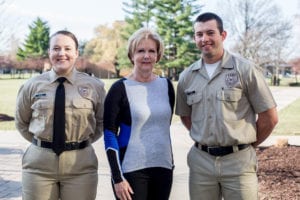
With the continuing rise of violent crime in the majority of large industrialized cities, law enforcement has added new tools to aid in combating violent criminal incidents and to keep police officer safety in mind. Enhanced GPS communication systems have led to game-changing crime detection computer programs that alert when the sound of shots fired is present. Body cameras provide officer and civilian safety, and the increasing use of drones is proving to be a key tool. Technology has also improved offender tracking by means of digital fingerprint evaluations, crime-mapping for community safety and the use of data to predict crime. Speeding tickets are now computerized and a newer device placed on police cars can alert officers if the vehicle in front, behind or along-side may be a stolen car or the driver is wanted for a crime. The growth of technology in this particular field is staggering and criminal justice students must understand the technology.
Geriann Brandt
Director, Criminal Justice Program
Assistant Professor of Criminal Justice
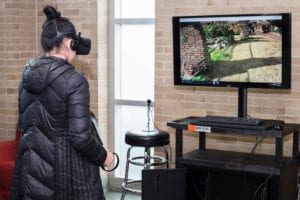 Learning Technology
Learning Technology
In 2018, learning technology will continue to become more interactive and customizable. Emerging technologies, like augmented reality (AR) and virtual reality (VR), will bring concepts to life by immersing students into interactive 3D worlds, providing a hands-on method for grasping difficult concepts. Data generated by students (e.g., assessment scores, in-class Q & A) will be analyzed in real-time by faculty in an attempt to better tailor their teaching to the immediate needs of the learner. This data will also fuel adaptive learning technologies, which will route students through a customized learning path based on the unique need of each individual.
Sam Harris
Director of Learning Technology and Support
School of Adult and Online Education
Nursing Research
In the treatment of spinal cord injury, there is a large human trial being conducted using epidural stimulation to improve function. This research is sponsored by the Christopher and Dana Reeve Paralysis Foundation as the BIG IDEA. It is the next step in functional electrical stimulation which is using electrical transmitters implanted into the spine to bridge the gap where a spinal cord injury has occurred either from trauma or disease. Previously, the stimulation was applied externally through electrodes placed on the skin. This goal of this trial is to increase function potential and quality of life. This is a huge step forward.
Linda Schultz, PhD, CRRN-A
Associate Professor of Nursing
Nursing Shortage
A significant nursing shortage continues to affect the nursing profession. For the practicing nurse, this means larger workload with high acuity patients. For patients, this means the quality of care may diminish. Schools of nursing are working to increase enrollments to help to alleviate the shortage. Maryville’s Catherine McAuley School of Nursing recently received permission from the Missouri State Board of Nursing to increase traditional day enrollment, and an additional clinical section of nursing students has joined the program.
Elizabeth A. Buck, PhD, RN
Assistant Dean for Nursing
Director of Online Nursing Programs
Professor of Nursing
Occupational Therapy
The Accreditation Council for Occupational Therapy Education (ACOTE) has mandated that entry-level occupational therapy education must move from the master’s to the doctoral level by 2027. This significant development reflects the profession’s strategic priorities for practice. Emerging practice for today’s occupational therapy students includes treatment of clients experiencing opioid abuse, community practice and the increased use of technology as an intervention and as a mechanism to provide service.
Bob Cunningham, PhD, OT/L, FAOTA
Director, Occupational Therapy Program
Physical Therapy
The profession will continue to promote physical therapists as movement experts who can identify, diagnose and treat movement problems. This is not simply a move-it-or-lose-it attitude, because how one moves may be contributing to any current pain. Physical therapy programs like Maryville’s are adopting a growing focus on prevention and how faulty movement may lead to future pain. The #ChoosePT public awareness campaign will be ongoing and will continue to focus on physical therapy as a safe and effective alternative to opioids.
Michelle Jenkins-Unterberg, DHS, PT
Assistant Dean, Walker College of Health Professions
Director, Physical Therapy Program
Associate Professor
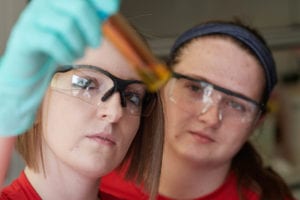 Science Entrepreneurism
Science Entrepreneurism
Science entrepreneurism is huge in St. Louis and has grown consistently over the past 15 years. Two organizations, BioSTL and Missouri Technology Corporation, are very active in the start-up community by funding and supporting growth to commercialization of products. BioGenerator and Cortex are startup hubs that have over 20 predominately biology- and science-based companies working on product development at their facilities. STL Maker Studios is available for prototyping via laser cutting, many wood shop options, 3D printing, powder coating, electronics station and an injection molder. It’s a great time to be working on innovative science in STL.
Tom Spudich, PhD
Associate Professor, Chemistry and Forensic Science
Social Media
Social media dominated our 2017 lives, and 2018 will prove no different. We are entertained by what we consume online, while simultaneously being annoyed by much of what is placed in front of us. We dare not look away, but we largely don’t like what we see. On top of that conundrum, so many of us are unknowingly addicted to social media. At the end of a binge day on Facebook, we’re not really sure if we had a good time or not. But we’ll do it again tomorrow. Have you ever reflexively unlocked your phone and instantaneously forgot why you did so? This is why Snapchat has a future. It’s not perfect, and it’s confusing for newbies. But after liberal use, you’ll find that Snapchat contains the least amount of complaining, much less posing and very little political news. It’s generally a happy place, and happiness does have a future on social media!
Chris Reimer
Associate Director of New Media
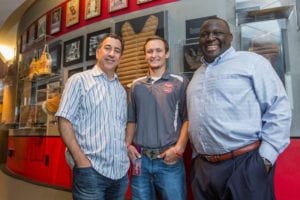 Sports Business Industry
Sports Business Industry
The sports business industry is ever-changing, but some new ideals are evolving. Teams and franchises will continue to diversify their portfolios to be more than a team but a brand that can transcend numerous markets, some of which have nothing to do with their team – for example, e-sports, entertainment, special events and entrepreneurship. In addition, analytics has taken over the business side as well as the performance side of sports, and industry jobs with this focus continue to open up.
Jason M. Williams, EdD
Assistant Dean, Simon School of Business
Director, Rawlings Sport Business Management Program
Assistant Professor
Student Services
Higher education has transformed into a service industry where our “customers”–primarily students–are now in control and expect the same consumer-level experience they enjoy in their daily life. To meet student expectations, universities need to deliver on promises of streamlined services. This can be accomplished enterprise-wide by aggregating the data we have through use of an engagement platform. Using such a platform to both reactively and pro-actively facilitate student interaction with peers, faculty and staff in a very personalized way makes it easier for students to find answers to questions, request immediate service, build their peer network and complete traditionally manual transactions (like changing their major) online. Only when universities adopt this approach will they be able to take advantage of engagement tools and analytics like artificial intelligence to meet consumer expectations. Going forward, universities like Maryville—an industry leader in the use of engagement tools—will differentiate themselves by offering unmatched customer experience.
Kathy Lueckeman
Chief Innovation Officer
